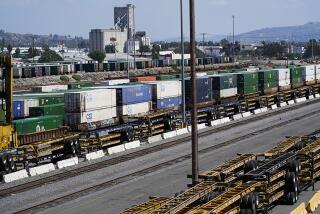Burlington Rail Asks Workers for Concessions : Firm Says Jobs Depend on Rise in Productivity
- Share via
NEW YORK — Burlington Northern Railroad asked its employees Tuesday to agree to changes in work rules that would greatly increase productivity and cut the railroad’s costs.
At the same time, it warned that as many as 12,000 workers--fully a third of its staff--could lose their jobs unless productivity improves. However, it added that this is a worst-case scenario.
“In the last few decades, the railroad workers have been on the top of all (unionized) wage scales,” said Michael Wenninger, a Burlington Northern spokesman in Fort Worth. He said the average railroad worker makes $44,000, of which about a third is in fringe benefits.
Burlington Northern Railroad accounts for about half of the revenue of its parent company, Burlington Northern Inc. The railroad operates over 25,539 miles of main and branch lines--the nation’s largest--spanning 25 states and parts of Canada.
Smaller Crews
Wenninger said that one of the work rule changes the railroad is seeking would reduce the size of crews on freight trains. Such trains have anywhere from 20 to 115 cars and now carry crews of four or five workers. The railroad would like to cut the crew to three, Wenninger said. The savings would be significant, he added, since Burlington Northern operates about 700 trains daily.
The railroad would also like to be able to “cross-utilize” union members so each worker can be used in several jobs. “We’d like to have more flexibility,” the Burlington Northern official said. “Right now, the workers go by the book.”
“It has been fairly well documented that railroad productivity rates are among the lowest in the United States,” said Scott Drysdale, a transportation analyst with Birr, Wilson, a San Francisco brokerage house.
A spokesman for the AFL-CIO in Washington, Rex Hardesty, said the railroad’s demands “sound like the normal management posturing.” The Brotherhood of Railway and Airline Clerks is an AFL-CIO union.
No Figure Named
James Shell, general manager of the Brotherhood of Locomotive Engineers, told the Associated Press: “Everything seems to be geared to fewer employees working longer hours for lesser salaries.”
Burlington spokesman Wenninger conceded that the railroad’s request is a bargaining tactic. “We are trying the soft-sell approach with the unions,” he said. He added that the company has announced no official figure for the number of jobs that could be eliminated. Wenninger said that, although the railroad has been making a profit, its return on investment--about 3%--is too low. It should be at least 10%, he added.
More to Read
Inside the business of entertainment
The Wide Shot brings you news, analysis and insights on everything from streaming wars to production — and what it all means for the future.
You may occasionally receive promotional content from the Los Angeles Times.










